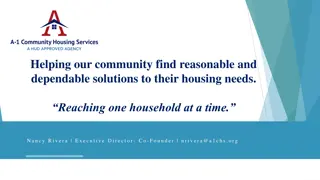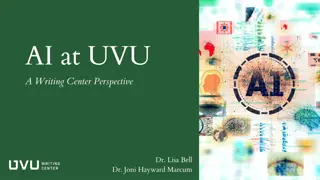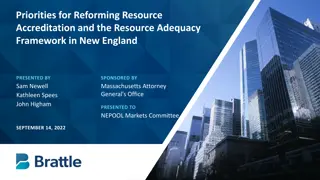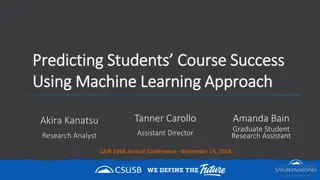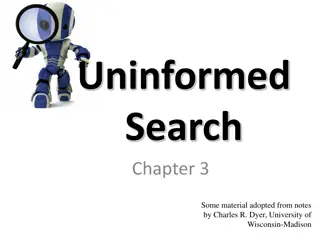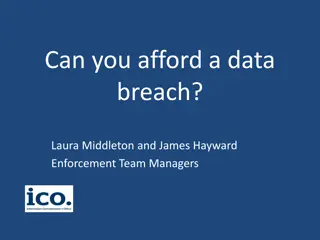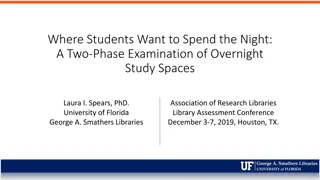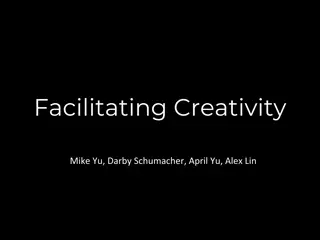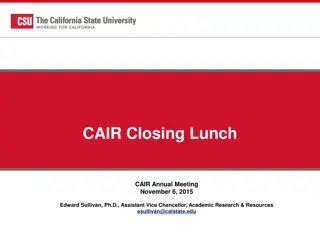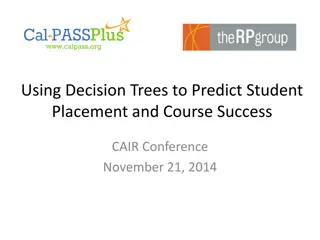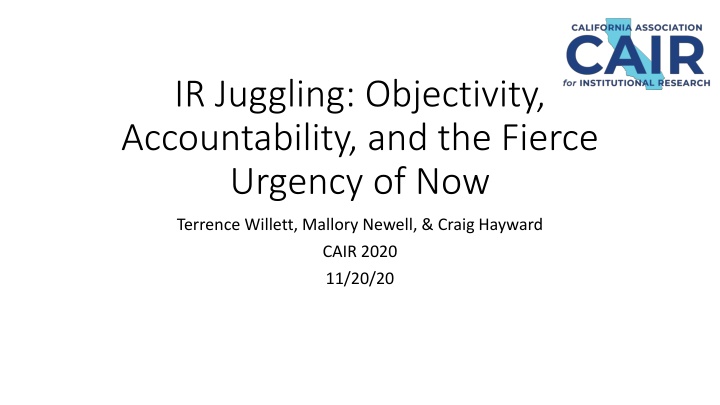
Juggling Objectivity, Accountability, and the Fierce Urgency of Now in Institutional Research
Explore the evolution and ethics of Institutional Research, including its history, codes of conduct, and impact on decision-making. Discover how organizations strive for objectivity and accountability while adapting to modern challenges.
Download Presentation

Please find below an Image/Link to download the presentation.
The content on the website is provided AS IS for your information and personal use only. It may not be sold, licensed, or shared on other websites without obtaining consent from the author. If you encounter any issues during the download, it is possible that the publisher has removed the file from their server.
You are allowed to download the files provided on this website for personal or commercial use, subject to the condition that they are used lawfully. All files are the property of their respective owners.
The content on the website is provided AS IS for your information and personal use only. It may not be sold, licensed, or shared on other websites without obtaining consent from the author.
E N D
Presentation Transcript
IR Juggling: Objectivity, Accountability, and the Fierce Urgency of Now Terrence Willett, Mallory Newell, & Craig Hayward CAIR 2020 11/20/20
Brief History of Institutional Research Brief History of Institutional Research CAIR began 1971 & incorporated 1988 RP Group north and south combined and incorporated in 1994 Partnership for Excellence (PFE) funding and accountability in 1998 began modern era of accountability for community colleges The term institutional effectiveness first appears around 1984 in conjunction with accreditation standards Head, R. B. (2011), The evolution of institutional effectiveness in the community college. New Directions for Community Colleges, 2011: 5- 11. doi:10.1002/cc.432
Ethics codes of IR organizations AIR: https://www.airweb.org/ir-data-professional-overview/statement-of-ethical-principles/principles CAIR: Same as AIR The Research and Planning Group (Draft): https://drive.google.com/file/d/1nsBTL0QlD10u9KyZR2EQSji_b2lk5pcD/view?usp=sharing We acknowledge that the individuals whose information we use have rights, derived from both legal and ethical principles that can cross national borders. Other organizations AERA Code of Ethics: https://www.aera.net/Portals/38/docs/About_AERA/CodeOfEthics(1).pdf USC s Pullias Center for Higher Education: https://pullias.usc.edu/about/ Academic Senate for California Community Colleges: https://www.asccc.org/policies/codeofethics Equal Opportunity - Ensure the right of all Executive Committee members, staff, volunteers, constituents, and Member Senates to appropriate and effective services without discrimination on the basis of race, ethnicity, gender/sex, sexual orientation, sexual identity, and expression (transsexual/transgender) disability status, religious and political affiliations, age, cultural background, socioeconomic status, academic and vocational disciplines, full- and part-time status, and the types of colleges that exist throughout the system, in accordance with all applicable legal and regulatory requirements.
Association of Institutional Research: AIR Ethics Statement Excerpt of interest from current AIR ethics statement: We recognize the consequences of our work. The analytic algorithms and applications we build and/or implement, as well as the policy decisions incorporating information we analyze and disseminate, impact people and situations. We make intentional efforts to protect their information from misuse or use that could cause them harm. Also of interest is that the current statement no longer includes the following from AIR s prior statement of ethical principles: We seek to be fair and transparent, providing objectivity and impartiality. AIR Statement of Ethical Principles (old)
https://rpgroup.org/Portals/0/Documents/Projects/MultipleMeasures/Deci sionRulesandAnalysisCode/Math-Decision-Trees-4_3_16.pdf
Enrollment in Transfer-Level English, Disaggregated by Ethnicity African American Asian Hispanic White 96.2% 94.8% 100% 94.5% 90% 92.4% 80% 70% 59.8% 60% 48.4% 50% 40% 34.7% 30% 30.7% 20% 10% 0% Fall 2015 Fall 2016 Fall 2017 Fall 2018 Fall 2019
Discussion Questions What is the role of IR/IE in the context of social justice and racial equity and holding colleges and personnel accountable for outcomes? Have you reviewed ethics statements of IR/IE organizations? Have you discussed ethics in your office? Should ethics statements be bold and include explicit statements about antiracism? What is the role of faculty allies in advancing the work of IR/IE?
Please use the WHOVA Mobile App to rate this session. CAIR uses the session evaluations to determine the winners of the Best New Presenter, and Best Presenter awards each year. Thank you! 8



